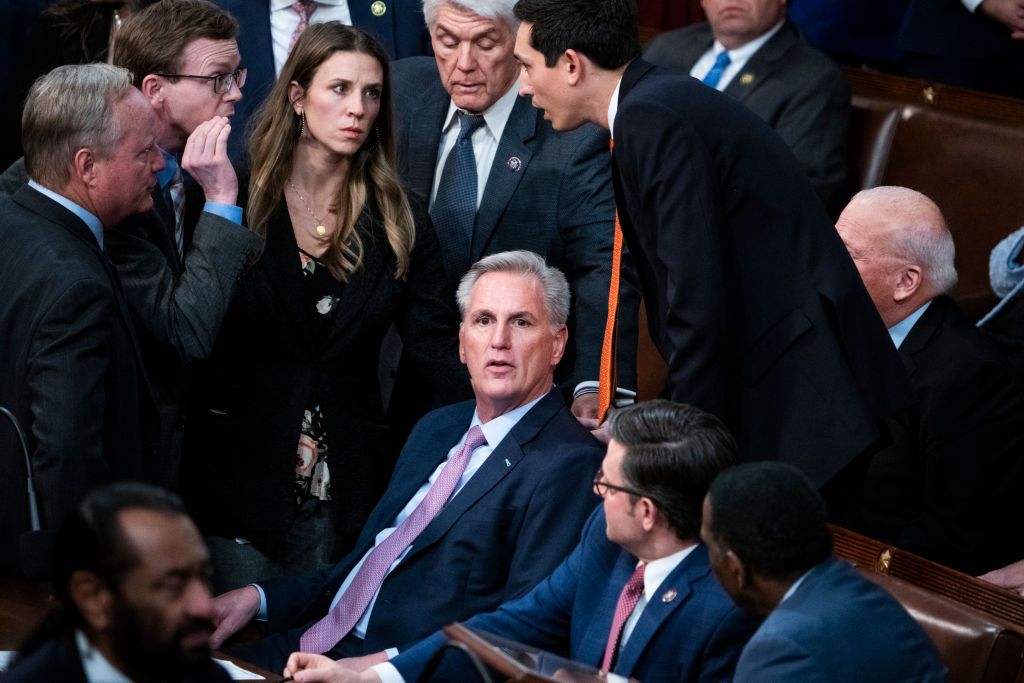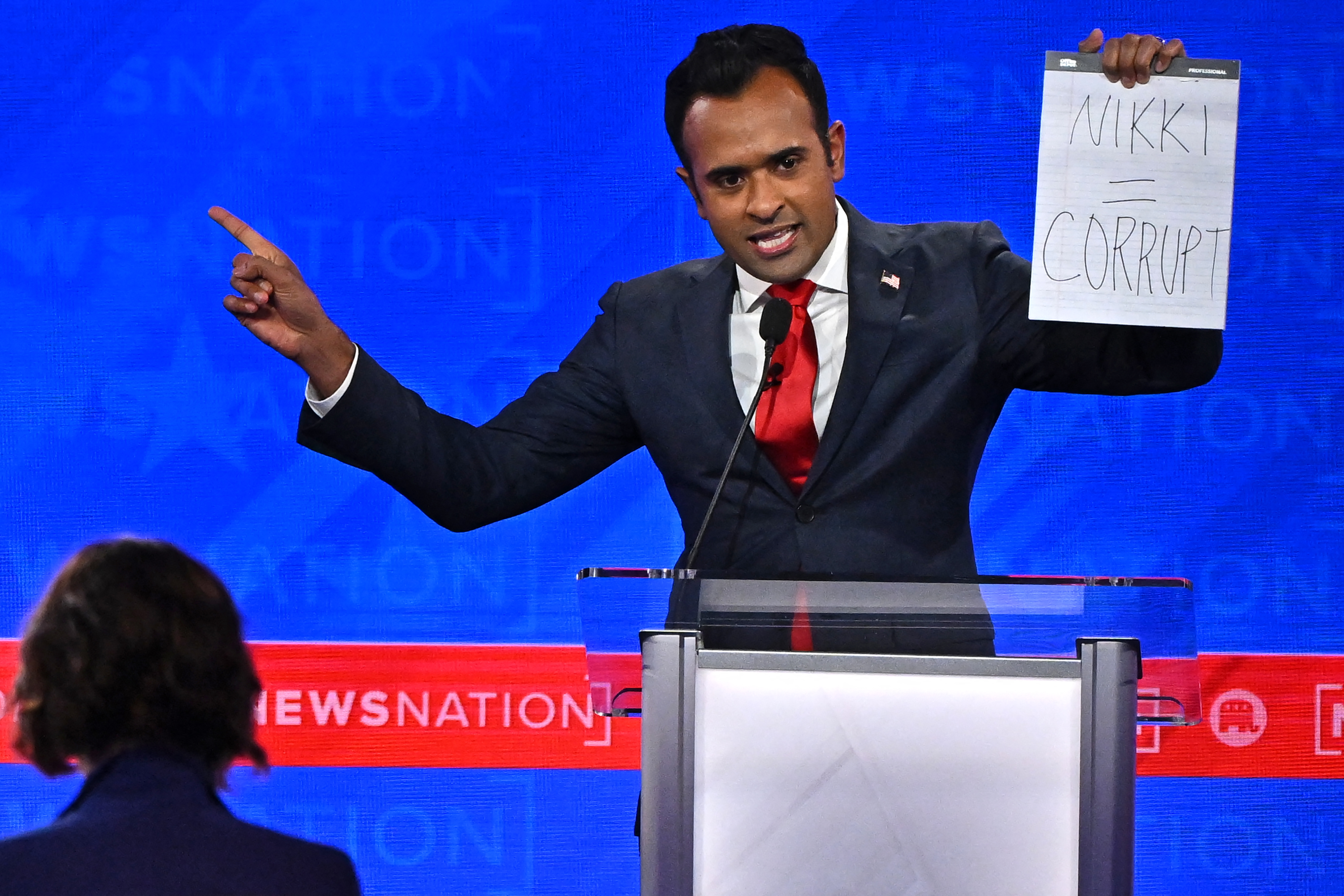2023: the year of GOP infighting
The battle for the heart and soul of the Republican party took center stage as conservatives struggled to bridge the MAGA divide


A free daily email with the biggest news stories of the day – and the best features from TheWeek.com
You are now subscribed
Your newsletter sign-up was successful
In truth, political in-fighting has been a feature of politics since the moment politics began. For as long as people have rallied around a cause or ideology, those rallies have been beset by disagreement and factionalism. In that sense, the intra-GOP rancor that defined much of the Republican Party's past year is not a fundamentally new phenomenon. Parties have wings, and wings vie for power and influence. What made this past year's Republican in-fighting so noteworthy is how disruptively widespread, and personally rancorous it was.
From their historic struggle to select congressional leadership to the ongoing — and thus far wholly unsuccessful — effort to unseat Donald Trump from his dominant perch atop the presidential primary field, Republicans in 2023 have seemingly spent as much time fighting amongst themselves as they have passing bills. To the extent that there has been actual legislating that's taken place this year (and there has!) it's been overshadowed in no small part by the GOP's tone, tenor, and energy spent arguing among themselves. For as much as "Dems in disarray" has become political shorthand for left-leaning dysfunction, the past 12 months of Republican intransigence has proven that no party has a monopoly on self-sabotaging maladjustment.
Whether electing a House speaker, deposing that speaker, electing another speaker of the House, breaking strangleholds on military promotions, or simply trying to stand out on a crowded debate stage, 2023 has been the year of — and for — Republican infighting.
The Week
Escape your echo chamber. Get the facts behind the news, plus analysis from multiple perspectives.

Sign up for The Week's Free Newsletters
From our morning news briefing to a weekly Good News Newsletter, get the best of The Week delivered directly to your inbox.
From our morning news briefing to a weekly Good News Newsletter, get the best of The Week delivered directly to your inbox.
Who speaks for the speaker?
Perhaps the biggest indicator of the coming year's frustrations and in-fighting came last January, just after Republicans narrowly regained control of a sharply divided House of Representatives in a midterm cycle that fell far short of expectations for a "red wave" that fall. Narrow majority in hand, California Rep. Kevin McCarthy — a longtime member of GOP House leadership — had initially "been seen as a shoo-in" to become the next Speaker of the House. Stung by their underwhelming showing in November, his fellow Republicans, however, disagreed, and forced McCarthy to endure a grueling and historic 15 rounds of voting before finally granting him the speaker's gavel — thanks to a slate of major concessions he'd made along the way including lowering the threshold for prompting his own ouster to just a single representative.
The raw opprobrium on display during the 15 rounds of speaker votes, coupled with his self-sabotaging agreement to accept a hair-trigger threat of ousting essentially set the tone for McCarthy's tenure as speaker, and the House GOP caucus at large. As The New York Times' Jonathan Swan and Annie Karni wrote just four months into McCarthy's speakership "[the] suspicions and divisions exposed during that process remain and are spilling out into the open."
If they were "spilling" in April, by the late summer those divisions had grown to a flood, as right-wing anger over McCarthy's willingness to negotiate away hardline conservative demands in order to avert a looming government shutdown exploded into full public view. Then, in early October, a small band of MAGA Republicans led by Florida Rep. Matt Gaetz pulled the trigger on the process to remove McCarthy from the speaker's chair in "a move without precedent that left the chamber without a leader and plunged it into chaos," according to The New York Times. Once McCarthy was successfully deposed, the intra-party acrimony only intensified, as Republicans spent weeks struggling to elect a successor who could unify the hardline MAGA wing with the main bulk of the caucus. It's telling that after Republicans finally selected "social conservative's social conservative" Rep. Mike Johnson (R-La.) to lead the chamber, both McCarthy and interim speaker Rep. Patrick McHenry (R-N.C.) announced plans to leave the House of Representatives for good.
At the same time, while not rising nearly to the level of open hostility as their colleagues in the House, Republicans in the ordinarily (and by design) more congenial Senate experienced their own share of intra-party frustrations aimed largely at Sen. Tommy Tuberville (R-Ala.), whose nearly yearlong blockade of military promotions earned a round of rare public rebukes from his fellow conservatives. "I do not respect men who do not honor their word," Iowa Sen. Joni Ernst lamented on the Senate floor, while Alaska's Dan Sullivan, a Marine Corps Reserve colonel, asked, "how dumb can we be?"
A free daily email with the biggest news stories of the day – and the best features from TheWeek.com
Donald, duck
Potshots and sideswipes against their fellow Republicans weren't limited to congressional lawmakers, either. Perhaps the most pointed — if slightly less immediately consequential — examples of Republican infighting over the past year have come from those striving to lead the party as standard-bearer and presidential nominee in 2024. Some candidates, like former UN Ambassador Nikki Haley, have tiptoed around overt broadsides, eschewing personal attacks for calls to induct a "new generation" of conservative leadership — an indirect condemnation of septuagenarian party frontrunner and undeniable center of gravity Donald Trump. Other candidates, like onetime Trump sycophant and former New Jersey Governor Chris Christie, have been more frontal in their attempts to derail Trump's seemingly iron grip on the GOP. More than any of the other high-profile candidates, Christie has been fully willing to attack Trump as a "cheap grifter" and a coward for his refusal to join the Republican debates, even resorting to an attempt at decidedly Trumpian name-calling.

Trump, meanwhile, has gone out of his way to attack Christie's health, and physique.

At the same time Haley, long-promised "never Trump" savior Ron DeSantis, and "anti-woke" crusader Vivek Ramaswamy have been locked in a particularly vicious three-way race for second place far behind Trump. It's a collision that's led to perhaps some of the most overtly, unsubtle moments of debate stage hostility to date, with Haley calling Ramaswamy "scum" at one point, only for the political neophyte to attack Haley as "corrupt" a few weeks later.

Photo by Jim Watson / AFP via Getty Image
While a measure of mud-slinging is to be expected in a hotly contested primary race, the level of callousness and mean-spiritedness on display among this crop of GOP candidates is a testament to just how commonplace this level of political infighting has become — particularly thanks to, and in the wake of, Donald Trump's commanding dominance over the party.
2024 will be the year that Republicans will, once again, line up behind a party nominee who will, ideally, unify the GOP's various wings and present a compelling, holistic vision of American conservatism moving forward. Perhaps that will actually happen, but if this past year has been any indication, Republicans will need to do a lot of work mending fences and rebuilding burnt bridges before they can move ahead, together.
Rafi Schwartz has worked as a politics writer at The Week since 2022, where he covers elections, Congress and the White House. He was previously a contributing writer with Mic focusing largely on politics, a senior writer with Splinter News, a staff writer for Fusion's news lab, and the managing editor of Heeb Magazine, a Jewish life and culture publication. Rafi's work has appeared in Rolling Stone, GOOD and The Forward, among others.
